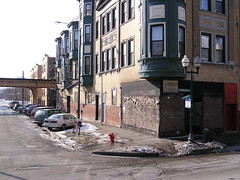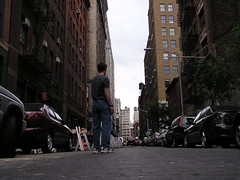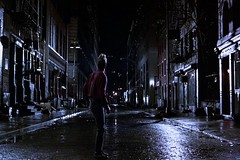In Peter Kramer's article (click above), Kramer finally has the chance to throw Camus at the undergraduates who have been pestering him since he wrote _Listening to Prozac_ in 1993. The teenagers are angsty and think that depression might make them artistic. Camus thinks that true resistance to the will of the gods can only come when Sisyphus takes true joy in pushing the boulder up the hill. Kramer cannot wait until we accept this as true, cannot wait for "carpe diem" to replace black lipstick on the lips of every mad undergraduate.
According to Kramer, the major culprit in our complacency against depressive illness is two-thousand-year-old myth that melancholy brings genius.
I'm not a historian of science, but here are a couple of points for departure. First, melancholy isn't depression. Melancholia, fervid in her depression in Durer's painting, represents the mental world of her own that ensconces the scholar in full intellectual tilt. In the seventeenth century, Richard Burton had analyzed melancholy and claimed that scholars in their isolation were particularly susceptible. Melancholy meant unstable enthusiasms of private thought, precipitous downs of remorse for failure and doubt about the world. "Of all my pleasures, none so sweet as melancholy." Its addiction is hardly based on a myth; melancholy means the ability to carry oneself up or down at a given moment based on the power of ideas alone. It means complete control over one's destiny: an absolute opposite, therefore, to depression.
Melancholy is the product of living alone and thinking too much. In a sense, scholastic melancholy is a purely geographical phenomenon. Like most academics, I suffer abundantly from melancholy. This winter I spent two months at Yale, stumbling through blizzards, hiding in libraries, unable to meet anybody aside from librarians for love or money or chain-smoking in bars. Depression. Great work. Astounding research. True enthusiasm for my projects. Weeping on my couch from the moment I got home every evening, while the snow-laden wind whistled outside my window and I thought about all the people who had ever blown me off in my life. I had a month of profound meditation on who I was, why I felt so needy, what makes a real friend versus someone with whom to pass the time, and how much of my lonesome lifestyle I had control over. It was terrible and revealing.
The depression all but vanished every time I got on a train out to New York, where I'd join old friends for art gallery openings and clubbing and ridiculous cocktails. It also dissipated from virtually the moment I returned to San Francisco. For the first month, melancholic fervor (without tears) alternated with life in a harmonic rhythm of study and travel. In the second month, my utter isolation from friends, family, chance encounters, and community of any sort, began to sink in. Melancholy gave way to depression -- situational depression. Bleak, yucky distress at a real social fact: the fact that I had absolutely no one to spend time with, and hated the fact that I'd chosen such a career.
Situational depression is a fact. Most of my mentors and colleagues have suffered from similar symptoms. Many can't get away. Few haven't turned to drugs of one kind or another at some point. The drugs generally don't fix anything, and the psychologists in question then shrug and point out the futility of medicalizing a situation that simply sucks. Loneliness is wretched. Meritocratic systems that stress unceasing labor as its own reward have problems providing regular relief to the lonely. Scholars tend to have less access to non-lonely situations than other people. Melancholy, that is, is a social fact: a kind of lifestyle that some people are more likely to have to face. Staying in melancholy too long can reinforce the physical and chemical paths of actual depression, like living in a room poisoned by mercury. But melancholy can also be the entree into true engagement with the world's problems, true mourning for the structures that keep us from each other, true awareness of how far off and difficult are the solutions. Then the scholar steps out again, back into the huge world thick and flush with people, movement, noise, and life.
Curing melancholy is a futile proposition. If anything, the curers risk enforcing the very social structures of loneliness that the melancholic is deeply aware of. We live in a world where friends and family comfort each other and search out people who are going through hard times. We also increasingly inhabit a world where we are advised to outsource our upset friends to medication. Scholars get outsourced a lot. If they come to expect it, this reinforces their own asocial behavior; melancholy goes straight into depression. But the root of melancholy still can't be cured, nor should it.
Kramer and friends are great scientists, but dangerous amateurs at social science. Melancholics love periods of isolation but then have to return: when they reenter the social sphere, certain social gateways have to be in place to receive them -- friends willing to listen, family willing to slightly coddle. Depression goes away, and in its place is a profound awareness of the variety of human experience; in short, true compassion. If Kaplan gets rid of these social gateways in the name of properly treating all depressives, he risks creating the kind of social disease for which there is no cure.



















